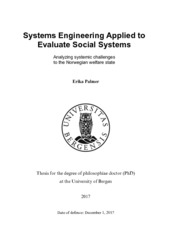| dc.contributor.author | Palmer, Erika | |
| dc.date.accessioned | 2018-01-03T11:55:32Z | |
| dc.date.available | 2018-01-03T11:55:32Z | |
| dc.date.issued | 2017-12-01 | |
| dc.identifier.isbn | 978-82-308-3921-8 | |
| dc.identifier.uri | https://hdl.handle.net/1956/17108 | |
| dc.description.abstract | The Norwegian welfare state is one of the most generous in the world providing social security through universal healthcare, education and childcare. Elderly Norwegians also face a relatively secure retirement with a solid pension system (even for those never employed), and the unemployed have access to resources for financial support and to facilitate their path back into paid employment. Given the generous nature of the Norwegian welfare state, there are concerns about its longevity. There is pressure from a variety of sources that puts stress on many social benefit categories in Norway. Social and economic sustainability are inextricably linked, such that social unsustainability can lead to economic unsustainability and vice versa. Demographic pressures affect both the economic and social sustainability of the Norwegian welfare state, as they threaten both. Although immigration and aging are both demographic challenges that receive a lot of attention in both public discourse and academia, of equal importance are the ways in which gender can affect the stability of the Norwegian welfare state. The social and economic sustainability of the Norwegian welfare state in light of current and future demographic challenges is the central focus of this PhD project. Welfare state research employs many methods both qualitative and quantitative, but there is a clear need for more and varied methods to analyze its diverse topics. This problem was highlighted by Esping-Andersen in a 2009 report to the Norwegian Research Council evaluating its program for welfare state research, called the VAM (Velferd, arbeidsliv og migrasjon) program. In this report, he explained that descriptive studies are represented disproportionately, and there are few examples of studies that employ state-of-the-art methods. He also goes on to explain that too often social scientists lack the methodological skill to handle complex data. He argues that, among other improvements, increasing the sophistication of the methodology will have a positive influence on the quality of applied research. Given the current methodological situation of welfare state research, this PhD project accepts the challenge posed by Esping-Andersen and uses innovative methods to evaluate Norwegian social policy using dynamic modeling and systems engineering. Systems engineering encourages an evaluation of the Norwegian welfare state as a system, and this discipline includes an array of tools and methods. However, to conduct the analysis in sufficient depth, the project focuses on two welfare state sub-systems: the pension system and the absenteeism system, and analyzes gender and related demographic challenges to each. This PhD project utilizes a type of dynamic modeling called system dynamics modeling. As a result, this PhD project achieves new insight into well- researched topics in social policy; the most important of which is the identification of specific structural mechanisms in welfare state systems, where policy can be directed to affect real change in system behavior. | en_US |
| dc.language.iso | eng | eng |
| dc.publisher | The University of Bergen | eng |
| dc.relation.haspart | Article 1: Palmer, E. (2017). Beyond Proximity: Consequentialist Ethics and System Dynamics. Nordic Journal of Applied Ethics. 1: 89-105. <a href="http://hdl.handle.net/1956/15723" target="blank"> http://hdl.handle.net/1956/15723</a> | eng |
| dc.relation.haspart | Article 2: Palmer, E. (2017). Structural Disadvantage: Evidence of Gender Disparities in the Norwegian Pension System. Social Sciences. 6(1): 22.<a href="http://hdl.handle.net/1956/15720" target="blank">http://hdl.handle.net/1956/15720</a> | eng |
| dc.relation.haspart | Article 3: Palmer, E. (2017). The heavy cost of care: Systemic challenges in Norwegian work absenteeism. Manuscript. Full-text not available. | eng |
| dc.relation.haspart | Article 4: Palmer, E. and Wilson, B. (2017). Models with Men and Women: Representing Gender in Dynamic Modeling of Social Systems. Journal of Science and Engineering Ethics, In press. <a href="http://hdl.handle.net/1956/17109" target="blank">http://hdl.handle.net/1956/17109</a> | eng |
| dc.title | Systems Engineering Applied to Evaluate Social Systems: Analyzing systemic challenges to the Norwegian welfare state | eng |
| dc.type | Doctoral thesis | en_US |
| dc.rights.holder | Copyright the author. All rights reserved. | en_US |
| dc.subject.nsi | VDP::Samfunnsvitenskap: 200::Statsvitenskap og organisasjonsteori: 240 | no |
